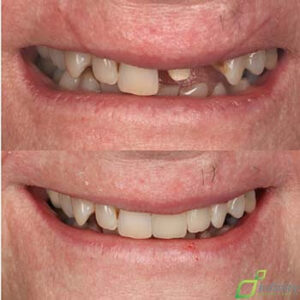A dental implant is a permanent structure designed to replace a missing tooth. The implant is a titanium post that your dentist or surgeon inserts into your jawbone to replicate an artificial tooth root. A porcelain crown is placed on top of the implant to complete the restoration. However, how long your implants last depends on how well you care for your teeth and oral hygiene.
So, how long does a dental implant last?
We can’t answer this question accurately because many factors affect how long an implant lasts. What we can say with certainty is that the first modern dental implants fitted by Dr Per Ingvar Branemark in 1965 into a patient that had suffered jaw problems all his life, causing his teeth to fail, were still going strong when he died some 40 years later.
What affects the lifespan of a dental implant?

- Oral health
- Medical conditions
- Lifestyle choices
- Injury or damage
- Which teeth are replaced and their position in the mouth
One or more of these factors can impact your oral health and ultimately how long your implant lasts. It’s best to discuss all your options with your dentist and divulge any existing medical conditions, so they can assess whether dental implants are a suitable treatment for you.
Oral health
Once you have undergone dental implant surgery, you will need to care for your dental implants just as you do your natural teeth. For the titanium ‘roots’ to fuse with the jawbone, a patient must have dense, healthy bones and gums. This natural process medically referred to as osseointegration is vital to the success and longevity of a dental implant. If there is insufficient bone, a patient may need a bone graft before getting implants fitted.
Your dentist will also check for any signs of gum disease before giving you the go-ahead for dental implant surgery.
Although the titanium post and the porcelain crown are resistant to tooth decay, the teeth and gums surrounding it are not – which is why meticulous hygiene is essential if you want your implants to last a long time.
Gum disease is the number one cause of tooth loss. If a dentist does not treat gum disease quickly, it can escalate into a more severe condition, causing receding gums and bone loss. This, in turn, may cause implant failure.
In most cases, implants can last a lifetime, but the dental crown will need replacement at some point.
Medical conditions
How long a dental implant does last can be affected by certain pre-existing medical conditions such as a weakened immune system or diabetes. These conditions can make a person more susceptible to infection and cause the body to take a long time to heal following dental implant surgery.
How well you’re able to manage your diabetes will affect how long your implants last. If you don’t have the condition under control, you will be more vulnerable to infection and implant failure.
We’ve already mentioned that osseointegration is paramount to how long dental implants last and their success rate. Your gums must heal properly and be as healthy as possible to support the titanium post and ensure your treatment lasts for many years.
Lifestyle choices
Choosing to smoke or drink alcohol excessively can significantly impact how long your implants last, particularly during the early stages of treatment.
There needs to be a good flow of blood to the surgical site to aid proper healing. Nicotine from tobacco restricts the blood vessels, inhibiting oxygen levels and slowing down the blood flow – factors that can impact your recovery after dental implant surgery.
Smoking also increases the risk of bacterial plaque that causes gum disease if not properly treated. Smoking before your implants are fully healed puts you at risk of infection and jeopardises osseointegration.
Patients should also refrain from having an alcoholic drink for 72 hours following dental implant surgery. Alcohol thins the blood, preventing it from clotting, which is necessary to help the gums heal. Excessive drinking can lead to dehydration which could cause soft tissues to dry out, preventing them from healing properly.
Injury or damage
Sometimes dental implants have a limited lifespan through no fault of your own. While implants are a permanent treatment, porcelain crowns are not indestructible, and just like natural teeth can crack or break.
Crowns can get damaged by:
- Eating chewy or sticky food
- Facial injuries
- Using teeth to remove bottle tops or tear apart plastic packaging
- Chewing hard substances such as ice or boiled sweets
While natural teeth and dental implants can withstand some pressure and force, using your teeth as tools will negatively affect how long your dental implants last.
Which teeth are replaced
Finally, which teeth are replaced and their location in the mouth will also affect how long your dental implants last.
For example, the molars at the back of your mouth are used primarily to chew your food and are under more pressure than other teeth.
Additionally, grinding your teeth (bruxism) is likely to how long your implants last. Wearing a nightguard when you sleep can help alleviate any damage.
Hopefully, this article has helped answer your question, “how long do dental implants last?”
As you can see, it differs from one patient to another and depends on how well you care for your teeth and oral health.
Are you ready for dental implants?
If you’re interested in the dental implants procedure, why not contact the experienced team at Infinity Dental Care. We provide digital implants using the latest technologies and techniques and offer 0% interest finance solutions. Call today on (02) 9159 6237 to schedule an appointment.


